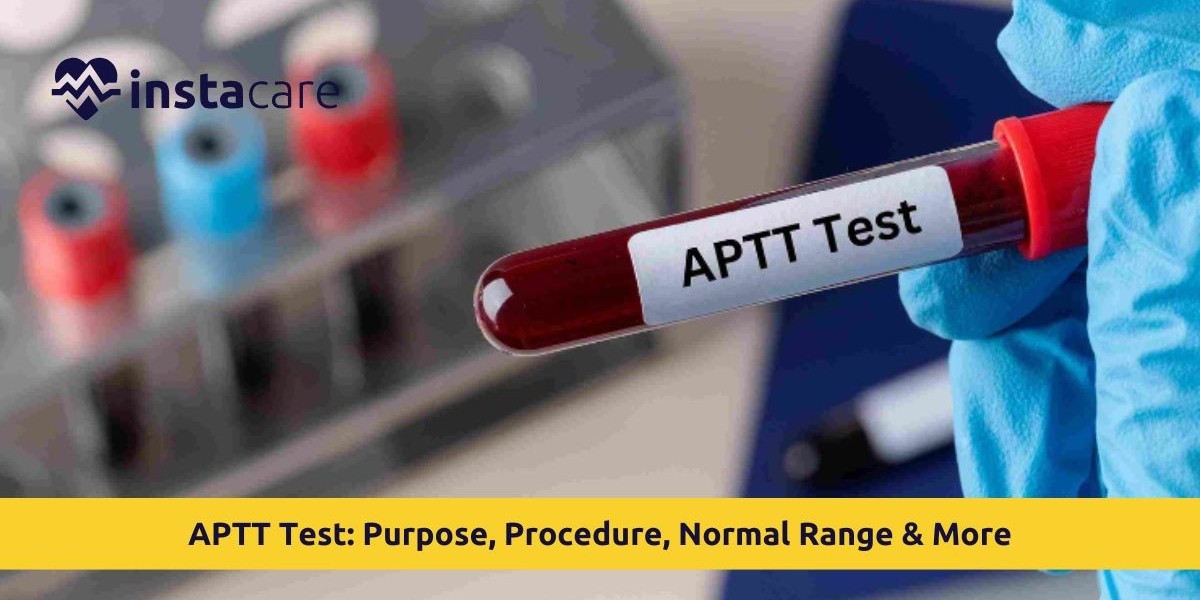When you’re preparing for surgery, there’s a long list of pre-operative tests your doctor may request. One of the most important among them is the APTT test, also known as the Activated Partial Thromboplastin Time test. Although many patients hear this name for the first time during surgical preparation, it plays a critical role in ensuring your safety during and after the procedure. This test evaluates how quickly your blood clots, helping doctors avoid complications like excessive bleeding. In this detailed guide, we will walk you through what the APTT test is, why it is done before surgery, how it is performed, and what your results mean.
What Is an APTT Test?
The APTT test measures how long it takes for your blood to clot after certain chemicals are added to it in a laboratory setting. Blood clotting is a complex process involving multiple proteins known as clotting factors. If even one of these factors is not functioning properly, it may cause slow or abnormal clotting.
The APTT test specifically evaluates the intrinsic and common pathways of the clotting system. Doctors use it to detect clotting disorders, monitor patients taking blood-thinning medications, and evaluate potential bleeding risks. Because even mild clotting issues can become serious during surgery, the APTT test becomes an essential pre-operative screening tool.
Why Doctors Recommend the APTT Test Before Surgery
Before any surgical procedure—even minor ones—your doctor needs to ensure your blood will clot properly to prevent severe bleeding. If your blood takes longer than normal to clot, it increases the risk of hemorrhage during surgery or excessive bleeding afterwards. This is why the APTT test is commonly added to the pre-surgery checklist.
The test helps identify underlying problems that may not show obvious symptoms, such as mild hemophilia, von Willebrand disease, liver disorders, or deficiencies in clotting factors. It can also reveal problems caused by medications like heparin, which is a blood thinner. Early detection allows doctors to take preventive measures, adjust medications, or even reschedule surgery until the issue is corrected. In short, the APTT test ensures your surgical team is fully prepared for a safe procedure.
When Is the APTT Test Needed?
Although commonly ordered before surgery, the APTT test is also required in several other medical situations. If you experience frequent nosebleeds, easy bruising, heavy menstrual bleeding, or prolonged bleeding after cuts or dental procedures, your doctor may request this test to evaluate your clotting function.
It is equally important for patients taking anticoagulant medications, especially heparin, as the test helps monitor its effectiveness and the risk of over-thinning the blood. In patients with liver diseases, autoimmune disorders, or suspected clotting factor deficiencies, the APTT test provides valuable insights. Before childbirth, major dental surgeries, or invasive procedures, doctors may also recommend it as a precautionary measure.
APTT Test Procedure: What to Expect
The APTT test is simple, quick, and painless. A sample of your blood is drawn from a vein—usually in your arm—by a trained phlebotomist. The entire process takes less than two minutes. The collected blood is then sent to the laboratory, where chemicals are added to trigger clotting. The time taken to form a clot is measured in seconds, which becomes your APTT value.
You can go home immediately after the blood sample is taken. No restrictions or recovery period is needed, and results are often available within a few hours. Many laboratories now offer online reports, allowing you to review your results conveniently from home.
How to Prepare for an APTT Test?
Most patients do not need any special preparation for the APTT test. You can eat, drink, and take your regular medicines unless your doctor gives different instructions. However, it is important to tell your doctor about all the medications and supplements you are taking, especially blood thinners, anti-inflammatory drugs, or hormonal treatments.
Some medicines can artificially prolong your APTT time, creating confusion during interpretation. Your doctor may ask you to temporarily pause certain medications before the test. Staying hydrated and wearing a loose-sleeved shirt can make the blood collection process smoother and quicker.
APTT Test Price in Pakistan
The APTT test is generally affordable in Pakistan and is widely available in major diagnostic laboratories. On average, the price ranges between Rs. 600 to Rs. 1,200, depending on the lab’s location, technology, and whether automated equipment is used. Reputable names like Dr. Essa Lab, Chughtai Lab, Excel Lab, and Aga Khan Lab typically fall within this price range. Online test booking through platforms like InstaCare often provides discounted rates and home sampling options.
Understanding APTT Test Results
Interpreting the results of an APTT test requires professional medical expertise. Generally, a normal APTT value falls between 25 to 35 seconds, but the reference range can vary slightly depending on the laboratory.
A prolonged APTT means your blood is taking longer than normal to clot. Possible causes include clotting factor deficiencies, heparin therapy, liver disease, vitamin K deficiency, or hereditary bleeding disorders like hemophilia. It may also indicate the presence of specific antibodies that interfere with clotting.
A shortened APTT is less common but may be seen in cases of inflammation, infection, or early stages of clot formation in the body. Your doctor will always interpret APTT results along with other tests such as PT (Prothrombin Time), platelet count, and clinical symptoms to make an accurate diagnosis. Never self-diagnose based on APTT results alone.
Why APTT Matters Specifically Before Surgery
During surgery, your body experiences tissue damage and blood vessel disruption. Because of this, the natural clotting mechanism must function perfectly to stop bleeding at the right time. If the clotting process is too slow, you may lose more blood than expected. If it is too fast, you may develop dangerous clots.
This balance is especially important for major surgeries such as cardiac operations, orthopedic procedures, abdominal surgeries, and C-sections. Even minor surgeries can become complicated if clotting problems go unnoticed. The APTT test ensures your surgeon and anesthesia team can take timely steps to manage bleeding risks, making it a crucial safety measure.
Book APTT Test from Dr. Essa Lab Through InstaCare & Get 20% Discount
If your doctor has recommended an APTT test, you can conveniently book it online from Dr. Essa Lab through InstaCare and receive a 20% discount. InstaCare provides secure online appointment scheduling, verified lab testing, and easy access to digital results—helping you save both time and money without compromising on quality.
Conclusion
The APTT test is an essential part of pre-surgery evaluation, giving doctors confidence in how your blood will behave during the operation. By checking your clotting ability beforehand, your medical team can reduce the risk of unexpected bleeding, adjust medications, and ensure a safer surgical experience. Understanding why this test is necessary can help you feel more prepared and confident before undergoing any procedure. With convenient online booking options like InstaCare, getting the test done has never been easier.
FAQs
1. Is fasting required before an APTT test?
No, fasting is not required. You can eat normally unless your doctor orders additional fasting-based tests.
2. How long does it take to receive APTT test results?
Most laboratories deliver results within a few hours, and many provide online reports for easy access.
3. What does a prolonged APTT value indicate?
A prolonged APTT suggests delayed blood clotting, which may be due to clotting factor deficiencies, liver disease, anticoagulant medications, or inherited bleeding disorders.






